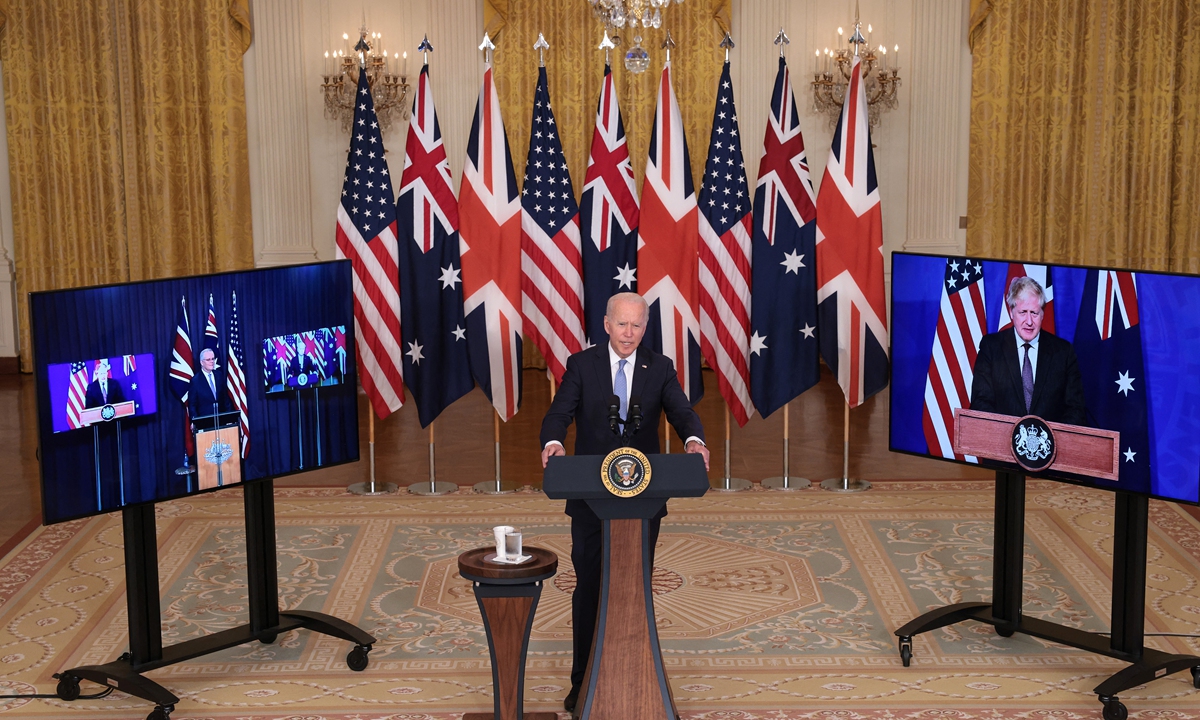
US President Joe Biden speaks during an event in the East Room of the White House on September 15, 2021 in Washington, DC. Biden announced a new national security initiative in partnership with Australian Prime Minister Scott Morrison (L) and UK Prime Minister Boris Johnson (R). Photo: AFP
Many countries have expressed concerns and doubts over AUKUS and the plan for nuclear submarine cooperation between the US, the UK and Australia as the move will pose potential danger for regional peace and stability and the international order, the Chinese Foreign Ministry said on Wednesday.
Hua Chunying, spokesperson for the ministry, said at a press conference that the international community is following it closely and is vigilant about AUKUS and the plan for nuclear submarine cooperation.
State Councilor and Foreign Minister Wang Yi pointed out on Tuesday when co-chairing the China-EU High-Level Strategic Dialogue with Josep Borrell, EU High Representative for Foreign Affairs and Security Policy, that AUKUS will pose potential dangers for regional peace and stability and the international order, according to Hua.
First, there is the danger of a Cold War resurgence. The three countries, drawing lines based on ideology, have built a new military bloc that will heighten geopolitical tensions. The international community rejects the Cold War and its divisions, but the US blatantly violates its political claims of not engaging in any new Cold War and gangs up with others to create a small Anglo-Saxon "clique," putting geopolitical self-interest above international solidarity. This is a typical Cold War mentality.
Second, there is the danger of an arms race. The move will spur regional countries to accelerate the development of military capabilities, and even seek to break the nuclear threshold and increase the risk of military conflict. The US, on the one hand, hands out sanctions and suppresses some countries to pressure them not to develop nuclear capabilities, while on the other hand flagrantly transferring nuclear technologies to non-nuclear states. This is a typical double standard.
Third, there is the danger of nuclear proliferation. In the name of building nuclear-powered submarines, the provision of nuclear materials to a non-nuclear-weapon state will exclude weapons-grade highly enriched uranium from necessary supervision and pose huge nuclear proliferation risks. The move will bring a shock to the non-proliferation system, undercut the South Pacific Nuclear Free Zone Treaty and ASEAN countries' efforts to build a Nuclear-Weapon-Free Zone (NWFZ) in Southeast Asia. This shows contempt for rules.
Hua's remarks came after International Atomic Energy Agency (IAEA) Director General Rafael Grossi said on Tuesday that the AUKUS deal in which Australia will obtain nuclear submarine technology from the US is a "very tricky" issue in terms of inspections. It will be the first time that a non-nuclear-weapon state regulated by the Treaty on the Non-Proliferation of Nuclear Weapons (NPT) introduces a nuclear submarine, and it means highly enriched uranium used in power reactors of nuclear submarines will be excluded from IAEA supervision. The IAEA will have to enter into a very complex technical negotiation to see to it that there is no weakening of the nuclear non-proliferation regime.
The Philippine presidential spokesperson also said that Philippine President Duterte is concerned that AUKUS could trigger a "nuclear arms race."
Hua said it should draw special attention from the international community that the IAEA safeguard mechanism cannot verify whether Australia will use highly enriched uranium in the power reactors of nuclear submarines for nuclear weapons. As Grossi said, the nuclear submarine cooperation between the US, the UK and Australia will be the first time that a non-nuclear-weapon state has acquired a nuclear submarine, which will exclude the highly enriched uranium from IAEA supervision.
In brief, this is a malicious exploitation of loopholes in international rules for out-and-out proliferation activities. Supervision of the Australian nuclear submarines will set a precedent, and it concerns the rights and obligations of all IAEA member states, especially signatories to the NPT, and will have a far-reaching impact on the international non-proliferation system. This is not an issue between the IAEA Secretariat and the three countries; it should be handled by all member states through joint consultation, said Hua.
China will stay in communication with the IAEA Secretariat and other member states to resolutely defend the authority and efficacy of the international non-proliferation system, Hua said.
